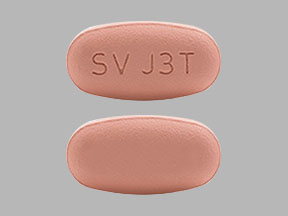Dolutegravir/rilpivirine Disease Interactions
There are 6 disease interactions with dolutegravir / rilpivirine.
Dolutegravir (applies to dolutegravir/rilpivirine) hemodialysis
Moderate Potential Hazard, Moderate plausibility.
Dolutegravir has not been studied in patients on dialysis, so caution is recommended if used in these patients.
Dolutegravir (applies to dolutegravir/rilpivirine) hepatitis
Moderate Potential Hazard, Moderate plausibility. Applicable conditions: Infectious Hepatitis
Patients with underlying hepatitis B or C may be at increased risk for worsening or development of transaminase elevations with the use of dolutegravir. In some cases there was hepatitis B reactivation particularly in a setting where anti- hepatitis treatment was withdrawn. Appropriate laboratory testing prior to initiating treatment and monitoring for hepatotoxicity during therapy is recommended in patients with underlying hepatitis B or C.
Dolutegravir (applies to dolutegravir/rilpivirine) liver impairment
Moderate Potential Hazard, Moderate plausibility. Applicable conditions: Liver Disease
The effect of severe hepatic impairment (Child - Pugh C) on the pharmacokinetics of dolutegravir has not been studied, therefore dolutegravir is not recommended for use on these patients. No dosage adjustment is needed for patients with mild or moderate hepatic impairment.
Rilpivirine (applies to dolutegravir/rilpivirine) depression
Moderate Potential Hazard, Moderate plausibility. Applicable conditions: Psychosis
Depressive symptoms including suicide ideation and suicide attempts have been reported with the use of rilpivirine. Patients should be monitored for the appearance of these symptoms and should seek medical evaluation immediately if severe depressive symptoms occur. Caution should be used in patients with a history of depression or other psychiatric conditions.
Rilpivirine (applies to dolutegravir/rilpivirine) liver impairment
Moderate Potential Hazard, Moderate plausibility. Applicable conditions: Liver Disease
Hepatic adverse events have been reported in patients taking rilpivirine. Patients with underlying hepatitis B or C virus infection or marked transaminase elevations prior to therapy may be at increased risk for worsening or development of transaminase elevations; a few cases of hepatic toxicity have been reported in patients without preexisting hepatic disease or other known risk factors. Appropriate laboratory testing before starting therapy and monitoring for hepatotoxicity during therapy are recommended in patients with underlying hepatic disease (e.g., hepatitis B or C virus infection) or in patients with marked baseline transaminase elevations. Rilpivirine has not been studied in patients with severe liver dysfunction (Child-Pugh C); caution is recommended.
Rilpivirine (applies to dolutegravir/rilpivirine) renal impairment
Moderate Potential Hazard, Moderate plausibility. Applicable conditions: Renal Dysfunction
Rilpivirine should be used with caution and with increased monitoring for side effects in patients with severe renal dysfunction or end-stage renal disease, as drug concentrations can be increased due to alteration of drug absorption, distribution, and metabolism secondary to renal dysfunction. No dose adjustment is required in patients with mild or moderate renal dysfunction.
Switch to professional interaction data
Dolutegravir/rilpivirine drug interactions
There are 477 drug interactions with dolutegravir / rilpivirine.
Dolutegravir/rilpivirine alcohol/food interactions
There are 3 alcohol/food interactions with dolutegravir / rilpivirine.
More about dolutegravir / rilpivirine
- dolutegravir/rilpivirine consumer information
- Check interactions
- Compare alternatives
- Reviews (8)
- Side effects
- Dosage information
- During pregnancy
- Drug class: antiviral combinations
- En español
Related treatment guides
Drug Interaction Classification
| Highly clinically significant. Avoid combinations; the risk of the interaction outweighs the benefit. | |
| Moderately clinically significant. Usually avoid combinations; use it only under special circumstances. | |
| Minimally clinically significant. Minimize risk; assess risk and consider an alternative drug, take steps to circumvent the interaction risk and/or institute a monitoring plan. | |
| No interaction information available. |
See also:
Further information
Always consult your healthcare provider to ensure the information displayed on this page applies to your personal circumstances.


